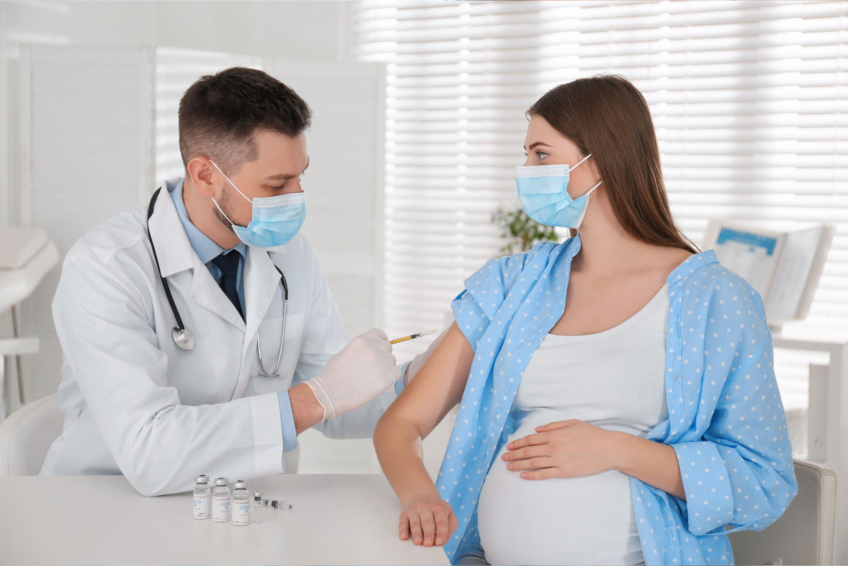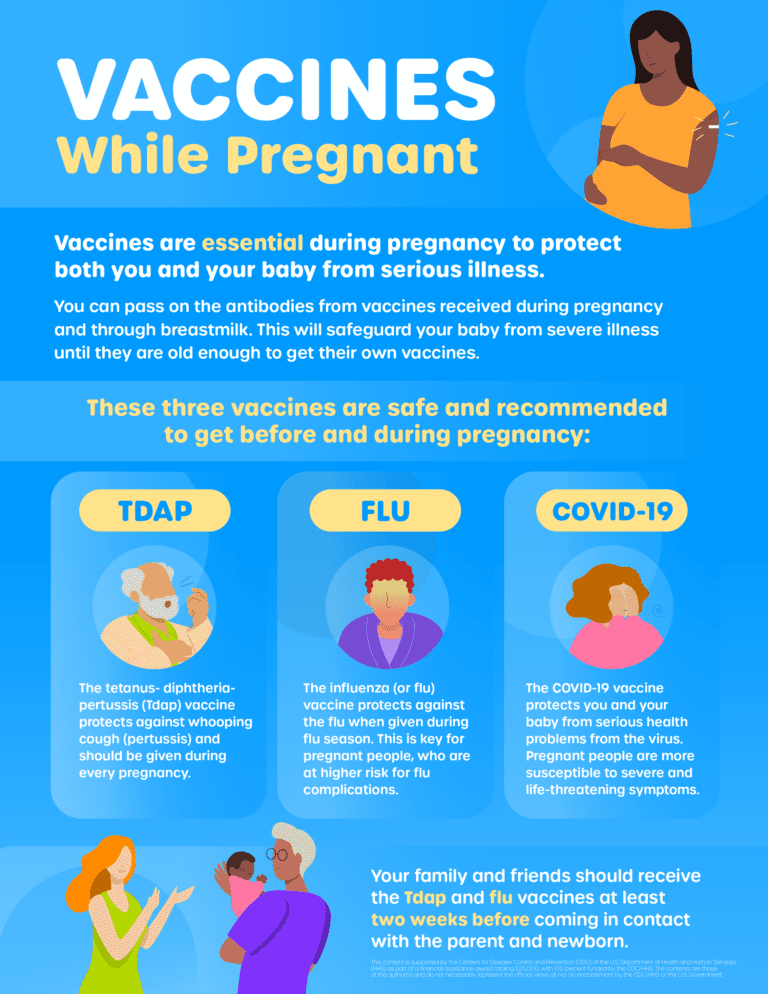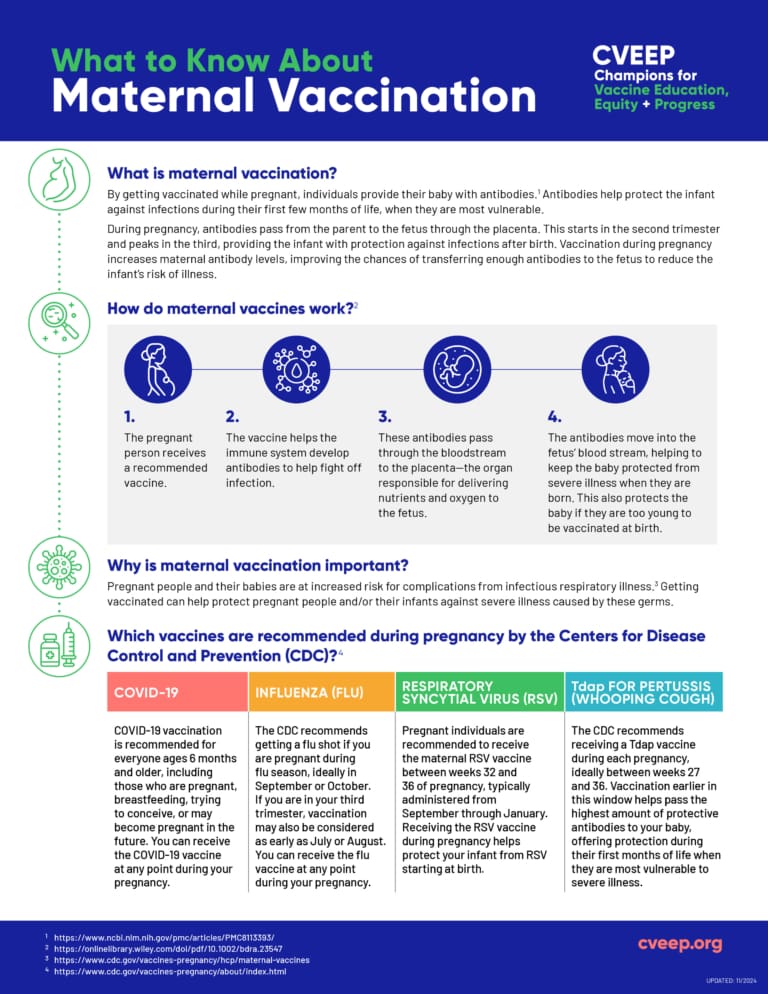
If you are pregnant or planning to become pregnant and wondering whether the COVID-19 vaccine is safe for you and your baby, the good news is it is. According to scientific data pregnancy increases your risk of a severe COVID-19 infection and complications, including a poor pregnancy outcome, admission to an intensive care unit, or death. Because of this, the benefits of getting a COVID-19 vaccine far outweigh any known or potential risks. COVID-19 vaccination is the best way to protect yourself and your pregnancy from these serious outcomes.
The protection the COVID-19 vaccine offers also reduces the severity of the illness and lessens how sick both mother and baby can become from COVID-19.
COVID-19 vaccines are proven safe and effective for your baby while breastfeeding. According to the CDC, vaccination during pregnancy builds antibodies that can help protect the baby. Whether you get the COVID-19 vaccine while you are pregnant or while you are breastfeeding, it passes on protective antibodies to your baby.
The American Academy of Family Physicians joined with other medical professional associations in recommending COVID-19 vaccines for pregnant individuals.
According to their statement, “As the leading organizations representing experts in maternal care … we strongly urge all pregnant individuals— along with recently pregnant, planning to become pregnant, lactating, and other eligible individuals—to be vaccinated against COVID-19.”
Path to improved health
Immunization always has been—and continues to be—a vital part of prenatal care when you are pregnant. It offers protection from preventable diseases to those who are pregnant and their infants during the first few months of life. The AAFP, Centers for Disease Control and Prevention (CDC), and the American College of Obstetricians and Gynecologists (ACOG) all recommend a series of vaccinations during pregnancy. The list of important vaccines includes tetanus, diphtheria, and acellular pertussis (Tdap) vaccine, the flu shot during flu season (October to March), and COVID-19 vaccine.
A flu shot, for example, not only helps prevent you from getting the flu, but it also will protect your newborn baby from getting the flu, too. Research shows that the flu vaccine protects infants for up to six months if their mothers get the vaccine while pregnant with them. This is because the mother’s antibodies (an important part of the immune system, which protects your body from getting sick) stay in the baby’s system after they are born.
Importance of COVID-19 vaccinations
Based on emerging evidence, it appears the COVID-19 vaccine provides some similar protections. In fact, pregnancy is not the only risk factor for experiencing a more severe form of COVID-19. Other risk factors include:
- Having certain underlying medical conditions
- Working in places where it is difficult or not possible to keep at lease 6 feet apart from people who might be sick
- Living or working in a community with high numbers of COVID-19 cases
- Living or working in a community with low levels of COVID-19 vaccination
- Being a part of some racial and ethnic minority groups, which have been put at increased risk of getting sick from COVID-19 because of the health inequities they face


Things to consider
Protecting yourself and your baby from COVID-19 is critical during pregnancy, before pregnancy, and while breastfeeding. The CDC encourages those who are pregnant, are breastfeeding, were recently pregnant, or thinking of becoming pregnant to:
- Get a COVID-19 vaccine and any boosters you are eligible for. The COVID-19 primary series of vaccines is available to everyone ages 6 months and older. All eligible booster vaccines are available for everyone ages 5 years and older.
- Talk to your doctor if you are pregnant and immunocompromised. This puts you at a higher risk of severe infection, complications, hospitalization, death, and poor pregnancy outcomes.
- Know your community’s rate of COVID-19 infections. If they are high, wear a mask and avoid going into large, indoor settings.
- Tell your doctor if you contract COVID-19 while you are pregnant. Follow your doctor’s instructions for keeping yourself well as well as your baby.
Questions to ask your doctor
- Which trimester is a COVID-19 vaccine recommended?
- What side effects should I look for after getting the COVID-19 vaccine?
- If I have side effects, will I pass them on to my baby?
- Do I need a booster if I got the vaccine a year before I became pregnant?
This article was supported by the American College of Obstetricians and Gynecologists (ACOG) and the Centers of Disease Control and Prevention (CDC) of the U.S. Department of Health and Human Services (HHS) as a part of a financial assistance award totaling $33,000 with 100% funded by ACOG and CDC/HHS. The contents are those of the author(s) and do not necessarily represent the official views of, nor an endorsement, by ACOG, CDC/HHS, or the U.S. Government.
![]()
Copyright © American Academy of Family Physicians
Esta información proporciona una visión general y puede que no se aplique a todos. Hable con su médico de familia para averiguar si esta información se aplica a usted y para obtener más información sobre este tema.







